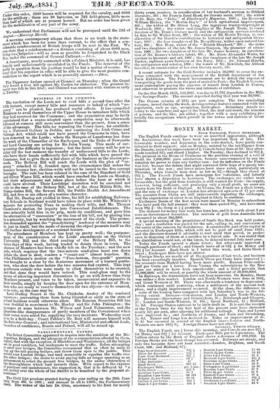BUSINESS IN THE COMMONS.
The resolution of the Lords not to read bills a second time after the 25th instant, except money bills and measures in behalf of which " ur- gency" can be pleaded, has produced useful effects. It has compelled Ministers to avail themselves of the Upper House to introduce bills which they had reserved for the Commons ; and the expectation may be fairly entertained that a course adopted upon compulsion may be afterwards followed at seasons still more convenient than the present, from a sense of the advantage. The bills for repealing the Usury-laws, for establish- ing a National Gallery in Dublin, and continuing the Irish Crime and Outrage Act, which could not have passed the Commons in time, have been removed to the Lords ; where the Marquis of Lansdowne has done the work of the Chancellor of the Exchequer, and the Duke of Newcastle and Lord Canning are acting for Sir John Young. This mode of sur- mounting the difficulty is ingenious ; but the fairer course will be not to delay till the last moment the transfer of undiscussed bills to the Lords, who have their hands sufficiently full with bills which have passed the Commons, but to give them a fair share of the business as the session pro- ceeds. The Bribery Bill will reach the Lords with the plea of "ur- gency" attached to it, founded upon the circumstance that unless the measure become law, election-wri4 will not be issued to the five corrupt boroughs. The rule has been relaxed in the case of the Standard of Gold and Silver Wares Bill, which would have reached the Lords on Monday, had their adjournment not taken place before the hour at which it could have arrived. Their Lordships' discretion will be exercised not only in the ease of the Bribery Bill, but of the three Militia Bills, the Stamp-duties Bill, the Sewers Bill, the Public Health Act Amendment Bill, and five or six others of a routine character.
Had Mr. Dunlop not yielded in time, his bill for establishing Reforma- tory Schools in Scotland would have taken its place with Mr. Whiteside's measure for protecting Nuns in making their wills, and Mr. Thomas Chambers's 'motion for inquiry into Conventual Establishments. The same minority held him in its grip, made its conditions, and gave him the alternative of "concession" or the loss of his bill, not by placing him in a minority, but by watching the movement of the clock. The protec- tion demanded against the "proselytizing" tendency of the measure may be just in itself, but the mode of securing the object presents itself as the still further development of a sessional feature.
The attendance of Members has kept up pretty well; the postpone- ment of the consideration of the Lords' amendments on the Oxford University Bill and the third reading of the Bribery Bill, to the latter days of this week, having tended to detain them in town. The absence of Members has been chiefly felt on the Tuesdays ; and the new rule, which requires that the two-minute sand-glass must run down before the door is shut, renders a " count-out " almost hopeless. Mr. John Phillimore's motion on the "Free-bottom, free-goods" question was brought to a close by the dexterous movement of a learned gentle- man, who dint the door before the two minutes had expired. This kept gentlemen outside who were ready to allow themselves to be counted, and that done they would have retired. This sand-glass may be the means of allowing important discussions to go on with fewer than forty Members present, and votes to be taken, inconvenient and expensive in their results, simply by keeping the door open for the entrance of Mem- bers who are ready to reserve themselves for two objects-to be counted, or to vote, as the case may be. Lord Dudley Stuart is the Mr. Chisholm Anstcy of the sessional reporters; preventing them from being liberated so early as the state of actual business would otherwise allow. His Russian Securities Bill has been fruitful in merriment to Mr. Henley and Sir John Pakington ; the Passages at arms between Mr. Wilson and Lord Palmerston, and the Phantom-like disappearance of portly members of the Government when their votes were asked for, supplying the racy incidents. Wednesday next is to be a field-day : Count Pahlen's Mr. Butt will measure himself with the Solicitor-General ; and international law, Ministerial and official feuds, breaches of confidence, Russia and Poland, will all be mixed up.


































 Previous page
Previous page